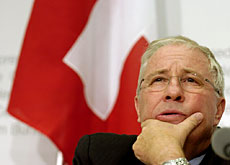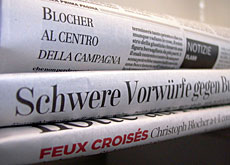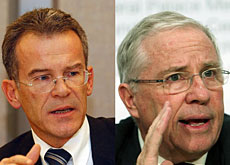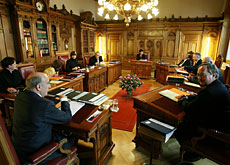Minister stirs debate over court independence

Supporters of Justice Minister Christoph Blocher have hit back at a parliamentary report criticising his handling of the former chief prosecutor's resignation.
At the same time experts are debating whether Blocher overstepped his mandate and undermined the strict separation of power between the judicial authorities and the government.
A key parliamentary committee on Wednesday published a report on the Swiss judicial system, and examined the departure of Federal Prosecutor Valentin Roschacher last year amid reports of disagreements with Blocher.
Both his rightwing Swiss People’s Party and the justice ministry slammed the report as unbalanced and politically motivated.
But Thomas Fleiner, professor of constitutional law at Fribourg University, says the criticism cannot just been brushed off.
“It is an extremely serious issue as the separation of power is a pillar of the rule of law,” Fleiner said.
He says the independence of the Federal Prosecutor’s Office in investigations is a key element.
“Otherwise a legal appraisal could be influenced by politicians in one way or another,” he pointed out.
Politicians
Fleiner says Blocher, who was elected to the cabinet in 2003, has repeatedly tried to increase the role of politicians.
“He would like to make law subject to the political intentions of parliament, his political party or the cabinet,” said Fleiner.
Hans Hirter, political scientist at Bern University, agrees that Blocher sometimes fails to distinguish between his role as justice minister and party strongman.
During the past four years Blocher notably criticised decisions by the Federal Court and argued international law was interfering with national legislation and the will of the people.
However, Hirter points out safeguards for the strict separation of powers was an issue for justice ministers across the world.
“Switzerland’s reputation could suffer if there are doubts that politicians respect the independence of the courts,” Hirter warned.
At the moment moves are underway to put the Federal Prosecutor’s Office under the control of the justice ministry, instead of sharing it out among the ministry and the Federal Court.

More
Federal Prosecutor
Striking back
The Swiss People’s Party on Thursday dismissed the report of the parliamentary committee as a renewed attack on Blocher ahead of parliamentary and cabinet elections later this year.
“The sole aim of the report is to discredit the party and Blocher. It is obviously politically motivated and part of a plot uncovered by the party.”
The justice ministry criticised the report as “full of holes” and “unbalanced”.
On Wednesday the cabinet – in an unprecedented move – decided to appoint a legal expert to assess the findings of the parliamentary committee and investigate reports of a conspiracy by Blocher aides to force the resignation of the Federal Prosecutor in July 2006.
Blocher denied any involvement in an alleged plot. He described the accusations in the media as “intolerable” and “dishonourable”.
swissinfo, Christian Raaflaub and Urs Geiser
Investigations by the Control Committee of the House of Representatives into the departure of the Federal Prosecutor Valentin Roschacher began more than a year ago.
A sub-committee is still examining reports of a conspiracy to force the departure of Roschacher.
He had resigned in July 2006 amid differences of opinion with Justice Minister Christoph Blocher.
Roschacher was accused of inefficiency, a controversial investigation into a suspected terrorist and an anti-terror deal with the US. But a report cleared him of any wrongdoing.
The handling of Roschacher’s resignation were also criticised by another committee earlier this year.
Publication of the report comes less than two months ahead of the October 21 parliamentary elections.
The Swiss legislative, executive and the judicial authorities share power according to the constitution.
Parliament as the legislative body debates and decides law, approves international treaties and elects the members of the government. It also oversees the federal administration.
The seven-member cabinet and the administration make up the executive body. They are responsible for implementing law. The government also presents bills to parliament.
The judicial authorities are composed of the Federal Court, the Federal Criminal Court and the Federal Administrative Court. However, there is no Constitutional Court in Switzerland.

In compliance with the JTI standards
More: SWI swissinfo.ch certified by the Journalism Trust Initiative





You can find an overview of ongoing debates with our journalists here. Please join us!
If you want to start a conversation about a topic raised in this article or want to report factual errors, email us at english@swissinfo.ch.